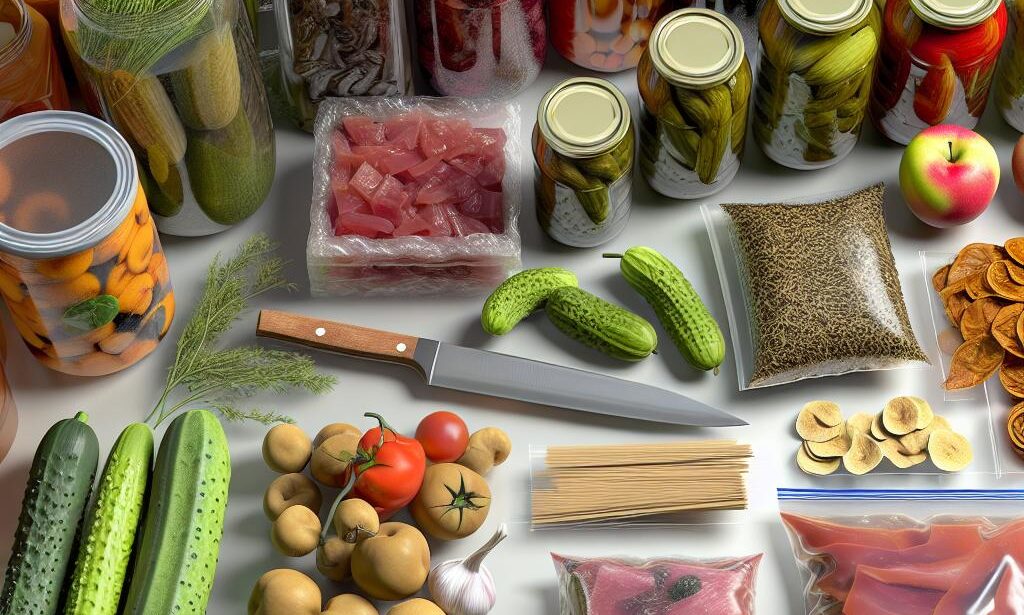Food waste is a significant issue that affects both the environment and our wallets. In order to combat this problem, it is important to implement effective food preservation techniques. By learning how to properly store and preserve food, we can reduce waste and save money. In this article, we will explore some practical and efficient tips for preserving food to help minimize waste in our homes.
Table of Contents
- Introduction to Food Preservation
- Understanding the Impact of Food Waste
- Best Practices for Storing Fresh Produce
- <a href="#utilizing-freezing-and-canning-techniques”>Utilizing Freezing and Canning Techniques
- Innovative Methods for Extending Shelf Life
- Q&A
- Final Thoughts

Introduction to Food Preservation
Food preservation is a crucial practice that helps reduce waste and ensures that food remains safe and edible for longer periods of time. By preserving food, we can extend its shelf life and minimize the amount of food that ends up in the trash. There are various methods of food preservation, each with its own benefits and considerations.
One effective method of food preservation is canning, which involves sealing food in airtight containers and heating them to destroy any microorganisms that could cause spoilage. Another popular method is freezing, which slows down the growth of microorganisms and enzymes that cause food to spoil. Dehydration is also a common preservation technique that involves removing moisture from food to inhibit the growth of bacteria, yeast, and mold. These are just a few examples of the many ways to preserve food and reduce waste.

Understanding the Impact of Food Waste
Food waste is a significant issue that has a major impact on the environment, economy, and society as a whole. By , we can take steps to reduce it and make a positive difference. One effective way to cut down on food waste is by learning and implementing food preservation techniques. By preserving food properly, we can extend its shelf life and reduce the amount of food that ends up in the trash.
Here are some effective food preservation tips to help you cut down on waste:
- Proper Storage: Store fruits and vegetables in the refrigerator to keep them fresh for longer.
- Canning: Preserve fruits and vegetables by canning them in jars using a water bath or pressure canner.
- Freezing: Freeze excess produce, meats, and prepared meals to extend their shelf life.
- Drying: Use a food dehydrator or oven to dry fruits, vegetables, and herbs for long-term storage.
| Food Preservation Method | Benefits |
| Proper Storage | Keeps fruits and vegetables fresh for longer |
| Canning | Preserves produce for long-term storage |
| Freezing | Extends the shelf life of meats and prepared meals |
| Drying | Allows for long-term storage of fruits, vegetables, and herbs |

Best Practices for Storing Fresh Produce
When it comes to storing fresh produce, there are several best practices that can help you minimize waste and keep your fruits and vegetables fresh for longer. By following these effective food preservation tips, you can not only save money but also reduce your environmental impact by cutting down on food waste.
One of the most important things to keep in mind when storing fresh produce is to ensure that it is kept in the right conditions. This includes controlling temperature, humidity, and airflow to prevent premature spoilage. Additionally, proper handling and storage techniques can help extend the shelf life of your fruits and vegetables, allowing you to enjoy them for a longer period of time.
Some include:
- Refrigeration: Store fruits and vegetables that require refrigeration in the crisper drawer to maintain optimal humidity levels.
- Proper packaging: Use breathable containers or perforated plastic bags to prevent moisture buildup and mold growth.
- Avoiding ethylene exposure: Keep ethylene-producing fruits separate from ethylene-sensitive produce to prevent premature ripening.

Utilizing Freezing and Canning Techniques
When it comes to cutting waste and preserving food, can be extremely effective. These methods not only help to extend the shelf life of perishable items but also allow you to enjoy your favorite fruits and vegetables all year round. Here are some tips for making the most out of freezing and canning:
- Freezing: Freezing is a simple and convenient way to preserve a wide variety of foods. Whether it’s berries, meats, or even cooked meals, freezing can help to lock in freshness and flavor. Be sure to use airtight containers or freezer bags to prevent freezer burn, and label everything with the date to keep track of freshness.
- Canning: Canning is a traditional method of food preservation that involves sealing food in jars and then heating them to kill any bacteria. This method is great for items like jams, pickles, and sauces. Invest in a good canner and follow proper canning techniques to ensure the safety and longevity of your preserved foods.
By incorporating these preservation techniques into your routine, you can reduce food waste and always have a supply of delicious, home-preserved goodies on hand.

Innovative Methods for Extending Shelf Life
When it comes to reducing food waste, effective food preservation is key. can help to minimize the amount of food that gets thrown away. By implementing these preservation tips, you can cut down on waste and save money in the long run.
One effective method for extending the shelf life of food is through vacuum sealing. This process removes air from the packaging, which helps to slow down the growth of bacteria and mold. Vacuum sealing can be used for a variety of foods, including meats, fruits, and vegetables. Another innovative method is using natural preservatives, such as salt, sugar, and vinegar, to help inhibit the growth of bacteria and spoilage. These natural preservatives can be used in pickling, curing, and fermenting foods to extend their shelf life.
| Food Preservation Method | Benefits |
|---|---|
| Vacuum Sealing | Slows down bacteria and mold growth |
| Natural Preservatives | Inhibits bacteria and spoilage |
Q&A
Q: Why is food preservation important?
A: Food preservation helps to reduce waste by extending the shelf life of perishable items, saving money and resources.
Q: What are some effective food preservation methods?
A: Some effective food preservation methods include canning, freezing, drying, pickling, and fermenting.
Q: How can I effectively store fruits and vegetables to prevent spoilage?
A: Storing fruits and vegetables in the refrigerator, in a cool, dark place, or in airtight containers can help prevent spoilage.
Q: What are some tips for preserving leftovers?
A: Leftovers can be preserved by storing them in airtight containers, labeling and dating them, and consuming them within a few days.
Q: How can I reduce food waste in my household?
A: You can reduce food waste by planning meals, buying only what you need, and properly storing and preserving perishable items.
Q: What are some common mistakes to avoid when preserving food?
A: Common mistakes to avoid when preserving food include not following proper canning procedures, using improper storage containers, and not labeling items with expiration dates.
Q: Are there any foods that cannot be effectively preserved?
A: Some foods, such as lettuce and certain dairy products, do not preserve well and are best consumed fresh.
Final Thoughts
In conclusion, reducing food waste through effective preservation techniques is not only beneficial for the environment but also for our wallets. By implementing these tips and tricks, we can extend the shelf life of our food, minimize our carbon footprint, and contribute to a more sustainable future. Whether it’s freezing, canning, pickling, or dehydrating, there are plenty of options available to help us make the most of our food and minimize waste. By being mindful of our food preservation practices, we can all play a part in cutting waste and creating a more sustainable food system.

